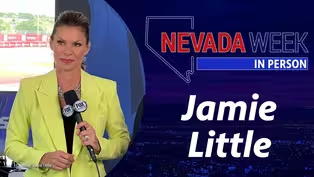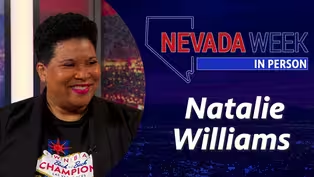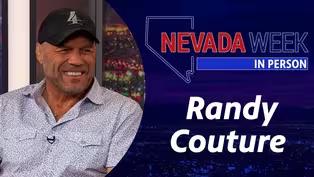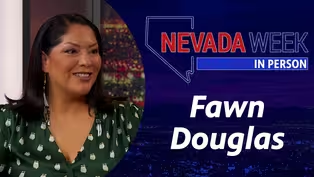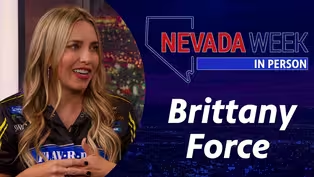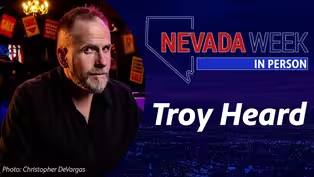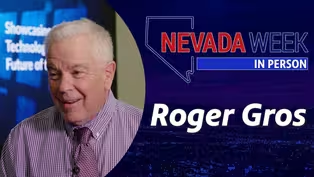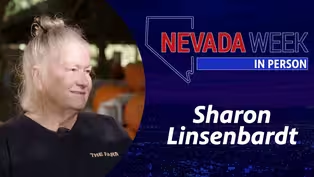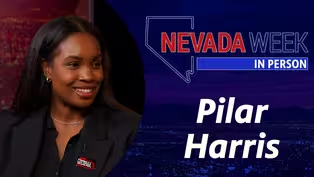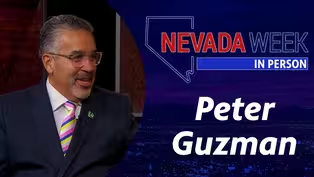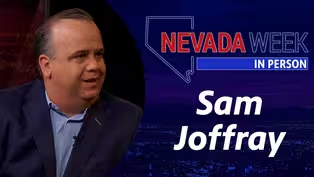
Nevada Week In Person | Norm Schilling
Season 1 Episode 64 | 14mVideo has Closed Captions
One-on-one interview desert gardening expert Norm Schilling.
One-on-one interview desert gardening expert Norm Schilling.
Problems playing video? | Closed Captioning Feedback
Problems playing video? | Closed Captioning Feedback
Nevada Week In Person is a local public television program presented by Vegas PBS

Nevada Week In Person | Norm Schilling
Season 1 Episode 64 | 14mVideo has Closed Captions
One-on-one interview desert gardening expert Norm Schilling.
Problems playing video? | Closed Captioning Feedback
How to Watch Nevada Week In Person
Nevada Week In Person is available to stream on pbs.org and the free PBS App, available on iPhone, Apple TV, Android TV, Android smartphones, Amazon Fire TV, Amazon Fire Tablet, Roku, Samsung Smart TV, and Vizio.
Providing Support for PBS.org
Learn Moreabout PBS online sponsorshipMore from This Collection
Nevada Week In Person goes beyond the roundtable discussion of Nevada Week with guests for a more casual conversation about their personal passions, new projects and compelling stories that are overlooked in the flurry of the news cycle.
Nevada Week In Person | Jamie Little
Video has Closed Captions
One-on-one interview with Jamie Little, NASCAR Broadcaster (14m)
Nevada Week In Person | Chet Buchanan
Video has Closed Captions
One-on-one interview with Chet Buchanan,Host & Creator, 98.5 KLUC’s The Chet Buchanan Show (14m)
Nevada Week In Person | Natalie Williams
Video has Closed Captions
One-on-one interview with Natalie Williams, General Manager, Las Vegas Aces (14m)
Nevada Week In Person | Randy Couture
Video has Closed Captions
One-on-one interview with Randy Couture, UFC Hall of Famer & U.S. Army Veteran (14m)
Nevada Week In Person | Fawn Douglas
Video has Closed Captions
One-on-one interview with Fawn Douglas, Artist and Activist, Nuwu Art (14m)
Nevada Week In Person | Brittany Force
Video has Closed Captions
One-on-one interview with Brittany Force, World Champion Drag Racer (14m)
Nevada Week In Person | Troy Heard
Video has Closed Captions
One-on-one interview with Troy Heard, Artistic Director, Majestic Repertory Theatre (14m)
Nevada Week In Person | Roger Gros
Video has Closed Captions
One-on-one interview with Roger Gros, Publisher, Global Gaming Business Magazine (14m)
Video has Closed Captions
One-on-one interview with Sharon Linsenbardt, Owner, Las Vegas Farm and Barn Buddies Rescu (14m)
Nevada Week In Person | Pilar Harris
Video has Closed Captions
One-on-one interview with Pilar Harris (14m)
Nevada Week In Person | Peter Guzman
Video has Closed Captions
One-on-one interview with Latin Chamber of Commerce Nevada President & CEO Peter Guzman (14m)
Nevada Week In Person | Sam Joffray
Video has Closed Captions
One-on-one interview with Sam Joffray, President & CEO, Las Vegas Super Bowl LVII Host Com (14m)
Providing Support for PBS.org
Learn Moreabout PBS online sponsorshipListeners of Nevada Public Radio know his voice.
He is co-host of Desert Bloom , and he regularly answers your gardening questions on KNPR's State of Nevada .
Norm Schilling is our very special guests on this week's Nevada Week In Person .
♪♪♪ Support for Nevada Week In Person is provided by Senator William H. Hernstadt.
-Thanks for joining us for Nevada Week In Person .
I'm Maria Silva.
This week's In Person , we're on the road.
We're in the front yard of one of the best known gardening and tree experts here in our valley, Mr.
Norm Schilling.
Thank you for letting us invade your garden.
(Norm Schilling) This is not an invasion.
It's truly my pleasure.
-I'm holding this right now.
I'm learning so much as I'm walking around and just taking it all in.
Hard to believe we're in Southern Nevada with all this beauty here.
Let's talk about this one.
-That's chocolate flower.
-Chocolate flower.
And it smells like chocolate.
-Yeah.
And just so you know, I didn't plant that.
I only planted one.
There's now about 15 that reseed themselves.
They're a good desert plant.
And they bloom prolifically throughout the spring, so for several months.
-And again, let's talk about the plants that can bloom here in the desert, because I never even heard of this.
-Yeah.
One of the challenges we have here is that there's a lot of-- a lot of plants that do really well here that are hard to find in our nurseries in the valley.
Now, they do have some nice desert plants, but there could be more.
Sometimes you need to go online and go-- The best thing is to get just-- You'll pay $8 for a little baby like this instead of a one gallon, but the most important thing is to get the right plant.
And there's some really cool websites out there, like High Country Gardens where you can just go explore desert plants, and they describe them well.
So just play online and order some stuff.
-Oh, you are so-- -Check out our nurseries too.
-Yes.
-And there's a new nursery coming called Mojave Bloom.
And probably six months, a year from now, it'll open.
And that's our nursery.
We're going to have our own nursery.
And we will specialize in desert plants or plants that do really well here.
-Let's talk about some of the plants that do really well here.
-I would be happy to.
-Let's do it.
-Well, it depends on-- Desert plants generally do much better.
They just, they like our soils.
They tend to have a really long bloom season.
They have incredible texture, color, form.
But they're just, they're less problematic.
But there's a lot of more what I call temperate region plants, moderate water use plants that will also perform well.
So behind us we have a blood orange.
Citrus can do really well.
But here in this garden, there's a big area of pink flowers right behind there.
I didn't plant any of them.
There's hundreds of penstemons that have receded themselves.
A lot of them reseed themselves.
There's, oh my gosh, there's so many to choose from.
And the cool thing about gardening, for me and for many people, is as you learn, there's always more to learn.
There's always something new to captivate you.
Or you go down these rabbit holes and you become an expert in agaves or oxalis or who knows.
-And I love how passionate you are.
I mean, I can see it right here as I'm sitting next to you.
I've watched some of your videos.
Where did that passion start for gardening?
How old were you?
Were you here in Las Vegas by that time?
-Yeah.
I came here when I was 10.
I thought this was the most butt ugly-- Can I say that?
--the most butt ugly place on earth.
I grew up in Woodland.
-Why?
-I grew up in Woodland, and I did not appreciate the desert at first.
-Okay.
-But when I got into my teens and 20s and I started getting out in the desert, it was pretty amazing.
And I've climbed that mountain, and there's just so many beautiful lands around here.
But gardening itself happened-- It was happenstance.
I used to work up at the city dump.
It was a really cool job.
I directed traffic.
I worked it out with my boss where I could salvage aluminum, copper.
I found really cool stuff.
I learned.
It brought out the entrepreneur in me.
Because I would, I would salvage trash and then I would go to the yards, the swap meet, and sell Las Vegas their trash back.
Anyways...
But I was gonna get fired-- -Oh.
- --for salvaging.
I wasn't allowed to do so.
But my boss was on the take, and so was his boss.
This is like '70s '80s Vegas, you know?
And as I was waiting to get fired, I kept thinking, Well, what am I going to do?
And there were all these guys that came to the dump every day, and they had these pickups full of grass.
And I thought, If they can do it, I can do it.
And I get to work for myself.
And in the '70s and '80s in Vegas, there were some bosses that didn't treat you well.
-So then you became your own boss, and then you-- -Yeah.
I threw a mower and a weed eater in a truck.
I said, I'm a gardener now.
And then about a week or two later, I bought a blower because it really does save a lot of time.
And then-- and then people would ask me questions.
I didn't know the answers.
I found out there was, there was a class at CSN where they were going to talk about turf care.
But it was two semesters, and I thought, How can you talk about mowing the grass for two semesters?
I took my first class.
Twelve years later, I finished both of the programs.
And as I did it and learned about it, it became more and more interesting.
And it just pulls you in.
It's just so fascinating.
-I have to say, do you love that CSN has that?
I didn't even know that even existed.
-Unfortunately, the program is no longer there.
-Oh, darn it!
Maybe you can bring it back.
So again, when I'm looking around here, I almost feel like I'm not in Southern Nevada.
I look at your beautiful fruit trees and I think, I feel like I'm in Pasadena somewhere.
But that just goes to show that you can grow all this beauty here in the desert.
-Right.
The desert plants are just a different plant palette.
Probably about 80% of my garden is desert plant material or desert zones.
They don't look like it.
So it's just, it's just they do the same thing.
It's just choosing plants that have lower water needs and that are more likely to like our alkaline soils.
-And let's talk about the lower water needs because that's huge right now, of course, as we go through a drought.
What are some of the plants, or what are some of the advice that you have for people who are thinking of creating this beautiful landscape and beautiful garden?
-Well, it's a difficult time.
I've been an environmentalist all my life, and I really believe in water conservation.
I've been a big supporter of the SNWA.
But right now with, you know-- When I started this garden 30 years ago, the lake was full.
Nobody ever talked about water shortages.
So some of my plants, some of my most beautiful and precious plants aren't drought tolerant, and my water bill is gonna go way up.
And I have to make some really difficult decisions.
I've been thinking of eliminating some veggie gardens, eliminating some of my fruit trees.
I don't want to.
I don't know what I'm going to do.
Fortunately, you know, I have a good income.
So I can, if I need to, pay that extra amount.
But the prices have gone up so much.
-Norm, and again, your passion.
What advice then do you have for someone who does still want to be able to enjoy this beauty in their backyard and their front yard?
What plants do you recommend?
We talk about some of your favorites.
Let's do that.
-Well, a lot of people have smaller homes and smaller yards.
So one of the keys is to put-- The key to gardening success is put a plant where it wants to be, give it room to grow, and then drink wine.
Right?
[laughter] And so there's a lot of really cool small desert trees, like sierra silver, mountain laurel, or Texas olive or book-leaf mallee that, that will grow into a garden space but not overwhelming.
Mesquites and palo verdes get really big.
If you got the room, they're great.
I have four screwbean mesquites that get watered about three times a year out here.
That's how drought tolerant they are.
But I have the room.
But you don't want to grow a large tree in a small space because you have to prune it.
It's a lot more work, and it's not going to be as attractive.
-All right, Norm.
Biggest myths when it comes to gardening here in Southern Nevada?
-Okay.
The gardening is-- The plants don't do well here.
They do.
Gardening is incredible here.
And in fact, we don't have some of the problems that others do.
In humid climates, there's a lot of problems with fungal diseases.
In this dry climate, we don't have to deal with a lot of that.
And that you can't grow fruits and veggies.
I mean, I've got like 9 citrus trees.
-You're proof!
-Right, right.
But grapefruit, my wife called me last year, two years ago, just to tell me she was eating the most delicious grapefruit of her life.
And these little trees, they're not that old.
They give us these huge-- Some of them are that big, but they have thick rinds.
But anyways, it's just you can eat a lot.
And veggie beds, if you do a raised bed, nice rich soil, good irrigation.
So you can grow all sorts of stuff here.
And I guess the third one would be that desert gardens are, by nature, boring and ugly and harsh.
And you know what?
They often are because they're not done well.
They put a shrub every seven feet on center, and it's just boring.
And there's all this harsh rock.
It doesn't need to be like that.
Desert plants are just a different plant palette.
And they often have incredibly long bloom seasons 8 months, 10 months of the year.
Or just all sorts of textures, colors, form, colors of foliage: silver and purple and oranges.
-Gorgeous!
-And it just all pops.
-Okay.
So I need to put you on the spot.
It's like again, we talk about like having to choose your favorite child.
No, mom.
They're all the same.
So which-- But I am putting you on the spot.
Which one is your favorite plant or flower?
-There's-- All right.
Favorite flower.
It's a cactus.
It's a trichocereus cirrus hybrid called flying saucer.
The flower is that big.
The colors are muted from orange to pink into a yellow throat with green stamens, and it's big enough you can put your face in there and be a bee.
And if it's backlit, the pedals are translucent and it just lights up.
But that's macro, right?
On a smaller scale, over here we have some bulbines.
If you take one of those little flowers and you take a hand loop and you hold it in the sun and you look at it, it glistens like jewels, like it's made of jewels.
And if you want to really go microscopic, if you take a gazania, which is an amazing flower to look at like this.
But if you put it under a microscope and you zoom in, the texture and color of those little buds inside there are just mind boggling.
Screwbeans are-- These trees are 15, 20 years old.
They look like they're 100.
The bristlecone pines up on the mountains, the big leaves in Belize where you can just pet the leaf, golden dyssodia, which is this little-- It looks so bad in pots in the nursery.
They really do.
But take a few home.
Get one or two of them to start, and they'll reseed themselves and they'll be little balls of golden flowers.
It smells so good.
The foliage, a little tiny pinch, and they'll receive themselves and they'll pop up under other plants.
And it blooms where it gets no water all winter.
So I mean, so there's a few.
-Yeah, and you have great information on your website as well.
I was on your website.
So you have some great stuff there.
And then one last question: Mother's Day coming up pretty soon.
We always, you know, give Mom roses.
Those roses die.
This year, let's do something different.
Right?
Let's go ahead and get them a plant or, you know, something that they can grow in their own garden.
What do you recommend?
-Well, all moms are different.
-That's true.
-It depends on what your mom likes and if she's into gardening at all.
There's some really tough resilient plants that she can enjoy.
You get it in bloom and then you put it out in the garden.
If your mom is into gardening, just feel her out and see what, you know, just talk to her and see what she really likes.
Or here, check this out.
-All right.
-Can I show you something?
This is a lesche digging tool.
It is the best gardening tool because I used to break trawels all the time.
This is-- Oops.
I was using it earlier.
-That's good.
You're putting it to good use.
-I've had this 35 years.
It's two pieces of welded steel.
It is indestructible.
It costs like about probably 45, 50 bucks.
Look, the sticker is still on it.
-I love it.
-But it lasts forever.
You just strap it on, and you go out in the garden and you can pry rocks out with this.
This was actually developed for rockhands.
So you know, maybe a gardening tool.
-Oh, gardening tool.
There you go.
-Real nice bypass pruners from a company called Bahco, B-a-h-c-o.
And make sure that the blades come past each other.
They make really nice equipment.
Any trade if you have good equipment to use, it's just so much more pleasurable.
-Okay, before we leave you, real quick, final advice for someone starting, a first-time gardener?
-Okay.
Don't lose heart.
Death is part of gardening.
This is beautiful here, right?
You won't see all the dead plants I've already pulled out and thrown in the trash, right?
That's part of it.
So don't lose heart; build on your successes.
Learn from your mistakes, and weed on-- Never spend a whole day weeding, because it will kill your love of gardening.
Weed on rainy-- After it rains, they come out of the ground.
And actually you take this and you pop it in the soil.
You go underneath the weed, you just lift it a little, and it comes right out.
And then do a little patch and do 10, 15 minutes and then go back in the house and drink some coffee.
And finally, get them out before they go to seed.
Pay attention.
Most of the time you can see the seeds forming.
If you get it out before it goes to seed, you don't have next year's population.
-Look at that.
Great advice, Norm.
Thank you so much.
We could be here all day.
-Thank you.
-Can't wait to get a tour of your beautiful garden in the back.
-I would love to.
-And thank you at home so much for watching Nevada Week In Person .
For more information, go to vegaspbs.org/nevadaweek.
♪♪♪

- News and Public Affairs

Top journalists deliver compelling original analysis of the hour's headlines.

- News and Public Affairs

FRONTLINE is investigative journalism that questions, explains and changes our world.












Support for PBS provided by:
Nevada Week In Person is a local public television program presented by Vegas PBS
